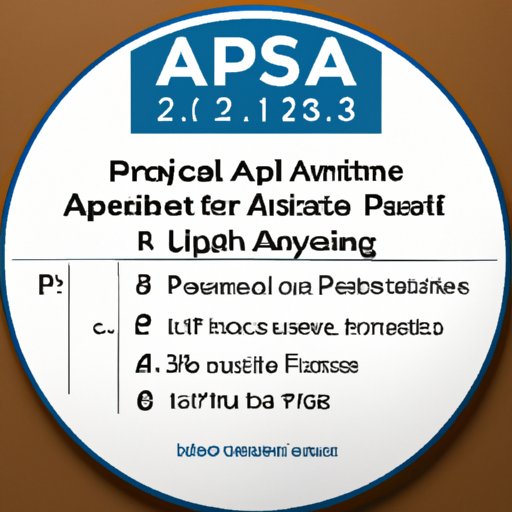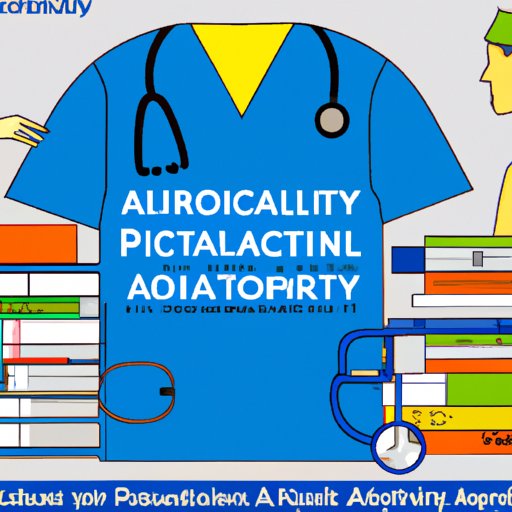Introduction
Physician assistants are healthcare professionals who provide medical services under the direct supervision of a licensed physician. They are responsible for performing physical exams, diagnosing illnesses, ordering laboratory tests, prescribing medications, providing patient education, and assisting with medical procedures. Becoming a physician assistant requires a significant amount of schooling, so it is important to understand the educational requirements and the different types of degree programs available.
Types of Degree Programs Available
To become a physician assistant, you must have at least a bachelor’s degree from an accredited institution. However, there are several different types of degree programs that you can pursue:
Bachelor’s Degree Program
A bachelor’s degree program typically takes four years to complete and includes courses in anatomy and physiology, clinical medicine, diagnostic procedures, pharmacology, and medical ethics. While some schools offer pre-professional programs specifically designed for students interested in becoming physician assistants, most students choose to get a degree in biology, nursing, or another related field.
Master’s Degree Program
A master’s degree program typically takes two years to complete and includes courses in advanced anatomy and physiology, clinical medicine, pharmacology, and medical ethics. Most master’s degree programs also include a clinical rotation component, which allows students to gain hands-on experience in a medical setting.
Certificate Program
Some schools offer certificate programs specifically designed for students interested in becoming physician assistants. These programs typically take one year to complete and focus on preparing students to take the Physician Assistant National Certifying Examination (PANCE).

Topics Covered in a Physician Assistant Degree Program
Regardless of which type of degree program you choose, there are certain topics that will be covered in all physician assistant degree programs. These topics include:
Anatomy and Physiology
Anatomy and physiology courses cover the structure and function of the human body. Students learn about the major systems of the body, including the skeletal, muscular, nervous, circulatory, respiratory, digestive, reproductive, and endocrine systems.
Clinical Medicine
Clinical medicine courses provide an overview of common medical conditions and their treatments. Students learn about diagnosis, disease management, and clinical decision-making.
Diagnostic Procedures
Courses in diagnostic procedures teach students how to order and interpret laboratory tests, imaging studies, and other diagnostic tools.
Pharmacology
Pharmacology courses provide an overview of commonly prescribed medications, including their indications, contraindications, interactions, side effects, and dosages.
Medical Ethics
Medical ethics courses cover topics such as patient confidentiality, informed consent, end-of-life care, and legal issues.

Length of Time to Complete a Physician Assistant Degree Program
The amount of time it takes to complete a physician assistant degree program depends on the type of degree program you choose. A bachelor’s degree program typically takes four years to complete, while a master’s degree program typically takes two years to complete. Certificate programs usually take one year to complete.
Cost of Attending a Physician Assistant School
The cost of attending a physician assistant school varies depending on the type of degree program you choose and the school you attend. Tuition costs for bachelor’s, master’s, and certificate programs range from $10,000 to $50,000 per year. In addition to tuition costs, students should also expect to pay for books, supplies, and living expenses.
Job Outlook for Physician Assistants
According to the U.S. Bureau of Labor Statistics, employment of physician assistants is projected to grow 28 percent from 2019 to 2029, much faster than the average for all occupations. The median annual wage for physician assistants was $112,260 in May 2020.

Benefits of Becoming a Physician Assistant
In addition to the job security and competitive salary that comes with being a physician assistant, there are many other benefits to pursuing this career. Physician assistants report high levels of job satisfaction and professional recognition due to their role in providing quality care to patients.
Conclusion
Becoming a physician assistant requires a significant amount of schooling, but the rewards are well worth the effort. There are a variety of degree programs available, each of which covers a wide range of topics related to clinical medicine. Additionally, physician assistants enjoy excellent job security and competitive salaries, as well as high levels of job satisfaction and professional recognition.
(Note: Is this article not meeting your expectations? Do you have knowledge or insights to share? Unlock new opportunities and expand your reach by joining our authors team. Click Registration to join us and share your expertise with our readers.)
